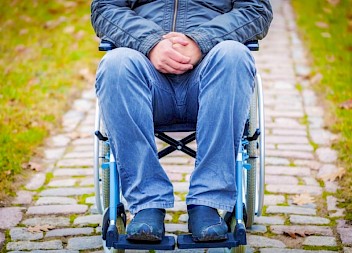Lower back pain affects thousands of people each year. But, in rare cases, back pain coupled with pain, numbness or weakness in both legs, or numbness around the genitals and anus can be a warning sign of Cauda Equina Syndrome (CES), which is compression of the 'horse's tail' nerves at the bottom of the spine.
If CES is suspected, it should always be treated as a medical emergency to reduce the risk of permanent paralysis or nerve damage. If there is a delay in diagnosis, there may be a case for a cauda equina negligence claim.
Read our case study below to see how we fought for our client to make a successful cauda equina claim, resulting in compensation totalling £150,000.
Cauda Equina Claim Case Study Background
Legal action was taken against North Cumbria Integrated Care NHS Foundation Trust through Christine Brown at Medical Solicitors after the orthopaedic team discharged the claimant, ‘C’, without a proper investigation of her symptoms.
Following her injuries, C struggles to look after or play with her two young children, walk her dogs, or drive a manual car. Active housework, such as tidying, cleaning, lifting washing and saucepans or gardening became impossible. Once her children were older, she intended to go back to work, but her symptoms restrict her ability to work. She suffers from numbness in the left leg, foot drop, and severe anxiety and a lack of social confidence due to her bowel and bladder problems.
The Timeline
C was 31 when she was referred urgently to the hospital by her GP after experiencing lower back pain for two weeks which had worsened in the previous 24 hours, along with reduced sensation to her left leg, and saddle paraesthesia, or loss of sensation to the inner thighs and groin, which is a red flag symptom for CES.
C arrived at the hospital around 1pm. Whilst in ED a rectal examination was carried out but the doctor made no contemporaneous note. C could not feel the examination [ a red flag for cauda equina].
An x-ray was arranged at 16:53 and C was admitted to the ward at 17:30. C was reviewed at 18:40 by the orthopaedic SHO who noted low back pain radiating to the back of the right thigh and leg, and numbness in the left leg and carried out a neurological examination, noting asymmetrical reflexes and weakness in both legs. The doctor suspected a progressing neurological condition and planned for an MRI scan the following morning as the scanner had closed for the day. The SHO did not carry out a perineal examination. C disputed the SHO’s notes which recorded no bladder or bowel issues.
Later that same evening, an orthopaedic registrar noted that power in the left and right lower limbs in all muscle groups was 5 (normal power), with a mild reduction in sensation at the lumbosacral joint on the left. The plan was to give her painkillers and get her mobile, and to arrange an MRI scan if symptoms worsened, or discharge her if not. The registrar noted that the rectal examination carried out earlier by another doctor found normal sensation and tone.
The following morning, C was seen by an orthopaedic consultant who did not examine her and noted she was sitting comfortably without pain in a chair and there was no neurological abnormality. The consultant noted she did not normally suffer back pain yet diagnosed low back pain with a history of chronic back pain, which was incorrect. C was discharged with no follow-up.
This was not a case of simple lower back pain. There was a clear history of neurological changes which required urgent MRI investigation. The MRI scan would have confirmed a large disc prolapse, or “slipped disc”, that was compressing the cauda equina nerves.
The disc prolapse was eventually diagnosed by MRI scan 11 weeks after the hospital admission. C was transferred to a hospital 60 miles away, where she underwent emergency surgery to decompress the spine and remove part of the disc that was pressing on the nerves. Sadly, this is a case of a delayed diagnosis which has left C with permanent injuries that affect her daily life, including severe loss of bowel and bladder function, as well as a foot drop.
What Was the Claim?
C alleged that during the admission she should have had an MRI scan and that the doctors failed to carry out a perineal examination. The doctors needed to assess sensation, anal reflex and anal tone and the ability to contract the sphincter. C accepted one of the doctors found normal sensation and tone but there is no note that other assessments were carried out. C further alleged that the Consultant failed to carry out a neurological examination and misdiagnosed her with simple lower back pain.
C’s case on causation was that a perineal examination would have found abnormalities and an MRI scan would have shown a large central disc prolapse that was pressing on the cauda equina nerves.
Had the doctors taken notice of the clinical findings, and the history of symptoms in both legs, and arranged an MRI scan, C would have been reviewed urgently by the neurosurgical team and decompression surgery would have likely taken place within 24 hours.
The defendant trust defended the claim and denied that, at any stage, C experienced true symptoms of cauda equina syndrome. The case proceeded towards a trial on liability.
Expert neurosurgeons were consulted by each party and agreed that earlier surgery would have avoided severe symptoms of bladder and bowel dysfunction, and left-sided foot drop.
The Outcome
Shortly, before the trial on liability, an out-of-court settlement was agreed at £150,000. Half of this sum gave C compensation for her injuries and past financial losses, and the remaining half was for loss of earning capacity and future financial losses including care, orthotics, aids and equipment, physiotherapy, adaptations to property, and psychological therapy.
Do You Have a Cauda Equina Negligence Case?
If you have suffered medical negligence related to cauda equina, please don’t hesitate to get in touch today. Our friendly team of specialists prioritise client care, and we can discuss your potential cauda equina negligence case with a no-obligation chat. We can also point you towards helpful Cauda Equina Syndrome support resources.
Please Note: Medical Solicitors specialise in cauda equina claims involving healthcare providers in England and Wales and will be more than willing to extend a helping hand if your case is located in either of these regions. Unfortunately, we do not handle cauda equina claims outside of England and Wales.



